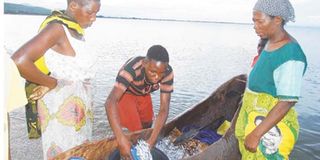Political will key to ending Tanzania-Malawi dispute

Fishmongers on Lake Nyasa. The waterbody is the source of conflict between Tanzania and Malawi. It’s also a source of livelihood for over 10 million people. PHOTO|FILE
What you need to know:
- This came as President John Magufuli and his Malawian counterpart Prof Peter Mutharika reportedly took time to discuss the matter on the sidelines of the African Union summit in Addis Ababa, Ethiopia, last week. The two leaders were said to have talked about the release of eight Tanzanians held in the neighbouring country on suspicions of spying since December last year.
The Joint Permanent Commission on Cooperation (JPCC) between Tanzania and Malawi met recently in an on-going effort to resolve the border dispute over Lake Nyasa. According to the head of communication and information in the Ministry of Foreign Affairs, Ms Mindi Kasiga, Dr Augustine Mahiga, the Foreign Affairs minister, was scheduled to lead the delegation.
This came as President John Magufuli and his Malawian counterpart Prof Peter Mutharika reportedly took time to discuss the matter on the sidelines of the African Union summit in Addis Ababa, Ethiopia, last week. The two leaders were said to have talked about the release of eight Tanzanians held in the neighbouring country on suspicions of spying since December last year.
At this point, what every peace loving Tanzanian and Malawian wishes is for the best outcome from the talks. It is worth noting also that no neighbours on the face of the earth are immune to conflicts. It is a fact of life that sovereign states all over the world – from the East to the West – have their down moments, when they squabble for several reasons. Tanzania and Malawi are not an exception.
Closer to home, Kenya and Uganda have had a rough time fuming down each other’s throat over the Migingo Island – a rocky islet that caused outrage, and triggered a ministerial crisis and brought our two neighbours to the brink of a shooting war. But they also resolved to sit down and talk – for the good of their peoples.
And the basis of the territorial conflict between Tanzania and Malawi is the latter’s claim to the waters of a lake whose very name they dispute. Malawi calls it ‘Lake Malawi’. The more traditional name is ‘Lake Nyasa’. Most ethnic groups, among them the Yao, Mang’anya, Matengo, Konde, Tonga and Nyakusa live harmoniously along the shores of Niassa/Nyassa, which means “any large body of water”.
On-and-off
Malawi, which linked the dispute to possible oil and gas reserves, claims to own the entire lake, while Tanzania maintains it owns half of the northern area. On the other hand, Tanzania argued that the standoff has continued on-and-off since the early 1960s, when there were no prospects of oil or gas. In the 1960s, Hastings Kamuzu Banda, the then president of Malawi, reportedly claimed Lake Nyasa, the whole Njombe in Mbeya areas in Tanzania were part of Malawi.
This is said to have provoked the wrath of President Julius Nyerere. A committee was appointed by both countries to solve the dispute over the lake and its name.
After repeated failures to resolve the ownership dispute, there is a glitter of hope that the political will evidenced in the recent, renewed efforts to break the impasse will bring the misunderstanding to an end. Dr Mahiga is also an experienced diplomat – his skills will no doubt be needed to ensure that Tanzania and Malawi continue to live as good neighbours.
History has it that long before the demarcation of Africa, the two countries coexisted, peacefully, and even permitted free migration and trade. We are one. It’s the arbitrary creation of boundaries by colonial masters that is to blame for these border issues, but that is not to say we should keep on using that as an excuse to fight.
Instead, it’s an opportunity to come to the table, talk things through, work together to implement whatever is agreed based on international regulations governing inland waterways and lakes. In fact, when all this is over, Tanzania and Malawi have a new opportunity to embark on joint programmes to save the lake from the destruction caused specifically by deforestation and bad farming.
The Lake is home to 1,000 species of fish. With an estimated fish stock of 168,000 tonnes, it is a source of livelihood for nearly 10 million people. Where there is political will – the ending should be a happy one!




